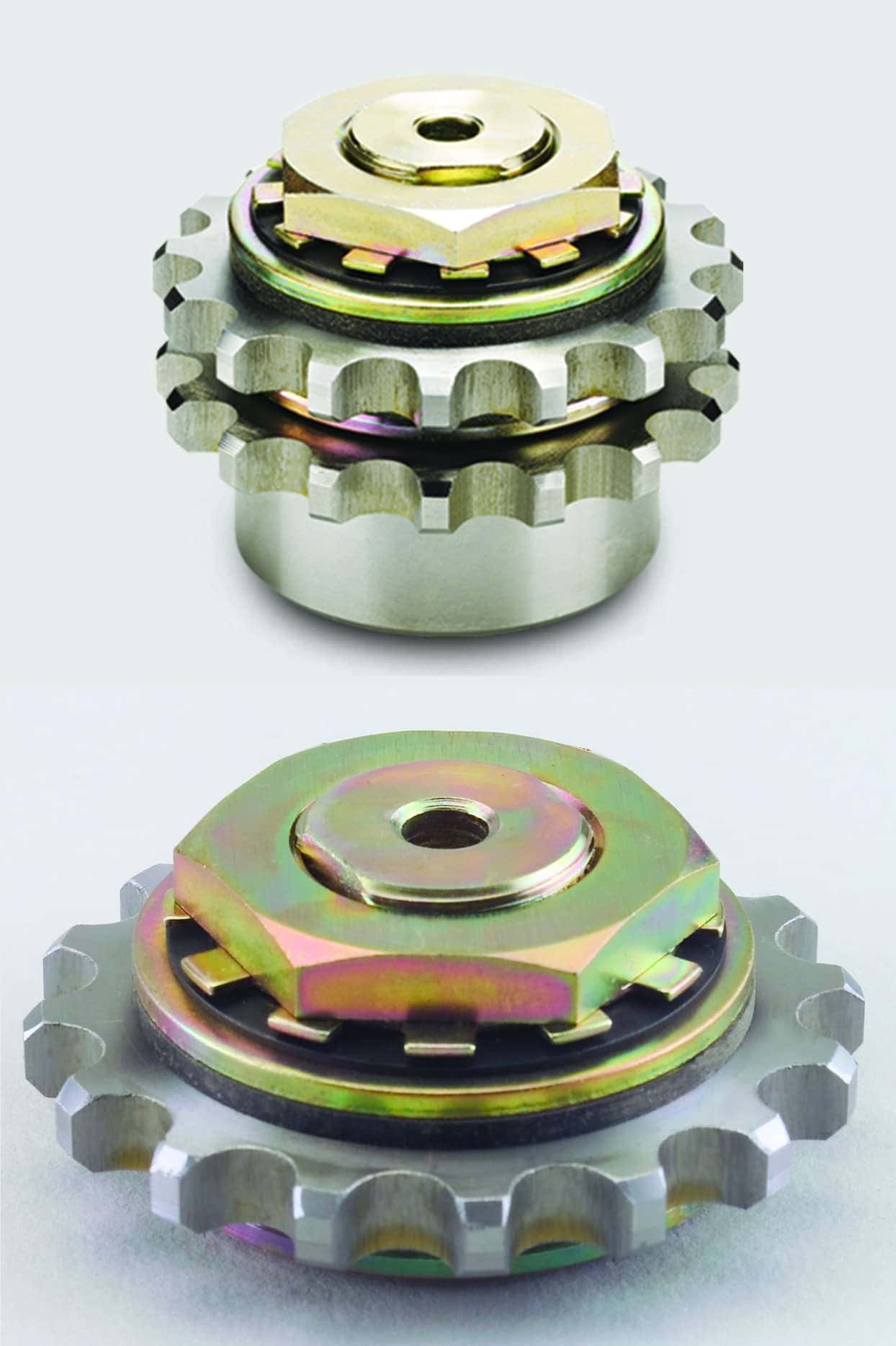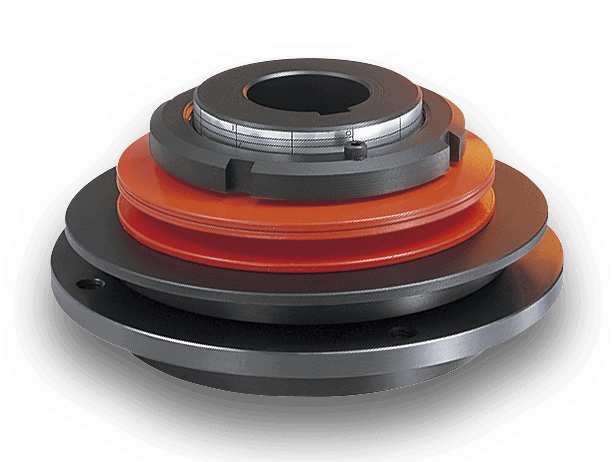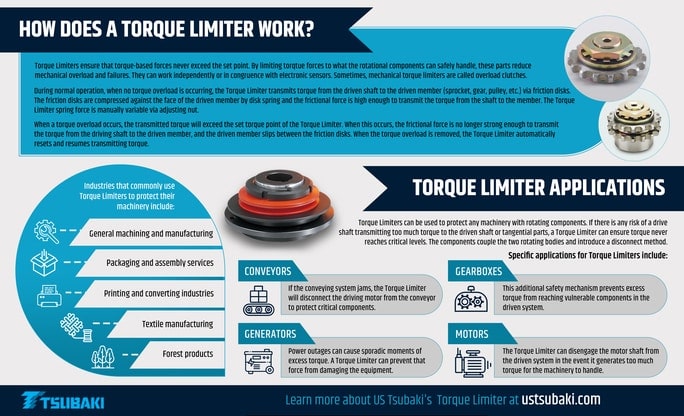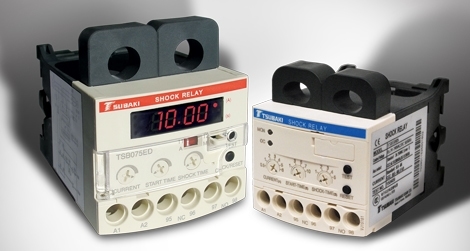What is a Torque Limiter?
Critical drive components can fail or fracture from just a single moment or action. This incidence, called mechanical overload, is when a rotating component experiences torques beyond what the system is designed to handle. Any rotating operation can develop a lot of torque and, if there is any kind of malfunction, all of that force can break affected components including, but not limited to, the couplings, the drive or motor shafts, and/or the gearing.
Mechanical overload protection devices like the Tsubaki Torque Limiter can help reduce the risk of critical component failure. Simply put, these devices protect rotating components from the risk of mechanical overload. Clutches, brakes, and Torque Limiters all fall under this classification.
Benefits of Using Torque Limiters
Torque limiters offer significant benefits to any mechanical system. By safeguarding equipment, they effectively prevent downtime and reduce maintenance costs, ultimately saving money. Specifically, Torque Limiters work by slipping during torque overload to prevent driven components from experiencing excessive torque loads.
When a torque overload occurs, the Torque Limiter acts as a mechanical circuit breaker. It disconnects the driving shaft from the driven components, protecting crucial equipment from damage. Additionally, they can be set at predetermined torque settings, ensuring that once the preset limit is reached, the device disengages.
This proactive approach to managing torque levels enhances the longevity and reliability of machinery, providing peace of mind and operational efficiency.
How Does a Torque Limiter Work?
Torque Limiters ensure that torque-based forces never exceed the set point. By limiting torque forces to what the rotational components can safely handle, these parts reduce mechanical overload and failures. They can work independently or in congruence with electronic sensors. Sometimes, mechanical torque limiters are called overload clutches.
During normal operation, when no torque overload is occurring, the Torque Limiter transmits torque from the driven shaft to the driven member (sprocket, gear, pulley, etc.) via friction disks. The friction disks are compressed against the face of the driven member by disk spring and the frictional force is high enough to transmit the torque from the shaft to the member. The Torque Limiter spring force is manually variable via adjusting nut.
When a torque overload occurs, the transmitted torque will exceed the set torque point of the Torque Limiter. When this occurs, the frictional force is no longer strong enough to transmit the torque from the driving shaft to the driven member, and the driven member slips between the friction disks. When the torque overload is removed, the Torque Limiter automatically resets and resumes transmitting torque.
Torque Limiter Applications
Torque Limiters can be used to protect any machinery with rotating components. If there is any risk of a drive shaft transmitting too much torque to the driven shaft or tangential parts, a Torque Limiter can ensure torque never reaches critical levels. The components couple the two rotating bodies and introduce a disconnect method.
Industries that commonly use Torque Limiters to protect their machinery include:
- General machining and manufacturing
- Packaging and assembly services
- Printing and converting industries
- Textile manufacturing
- Forest products
Specific applications for Torque Limiters include:
- Conveyors: If the conveying system jams, the Torque Limiter will disconnect the driving motor from the conveyor to protect critical components.
- Gearboxes: This additional safety mechanism prevents excess torque from reaching vulnerable components in the driven system.
- Generators: Power outages can cause sporadic moments of excess torque. A Torque Limiter can prevent that force from damaging the equipment.
- Motors: The Torque Limiter can disengage the motor shaft from the driven system in the event it generates too much torque for the machinery to handle.
Advantages of Torque Limiters in Cost and Accuracy
Torque limiters offer significant benefits when it comes to cost efficiency and precision. Here’s how:
- Cost Savings: By acting as a mechanical circuit breaker, torque limiters prevent machinery damage that could lead to costly repairs. They help avoid unscheduled downtime, ensuring continuous operation and minimizing loss from halted production.
- Reduced Total Cost of Ownership: With their ability to protect equipment from overload, torque limiters lower maintenance expenses and extend the lifespan of machinery. This efficiency translates into a lower total cost of ownership over time, making them a smart investment for any operation.
- Enhanced Accuracy: Torque limiters provide precise control by disengaging at a predetermined torque setting. This precision ensures that machinery operates within safe limits, reducing the risk of damage and thereby maintaining product quality and consistency.
In summary, torque limiters deliver outstanding value by safeguarding equipment, ensuring operational accuracy, and minimizing costs, making them essential components in modern mechanical systems.
Leading Torque Limiter Solutions from Tsubaki
When it comes to reliable torque limiter solutions, Tsubaki stands out as a leader in engineering excellence and innovation. Known for precision and quality, Tsubaki’s torque limiters are designed to ensure smooth and uninterrupted operations across a variety of industries.
With a commitment to delivering dependable performance, Tsubaki provides torque limiters that protect machinery from overload conditions, enhancing the safety and efficiency of your equipment. Their products are built to meet the demands of diverse applications, offering the perfect combination of durability and reliability.
Choose Tsubaki for torque limiter solutions backed by a reputation for quality, innovation, and proven performance.
Finding the Perfect Torque Limiter for Your Needs
Navigating the world of torque limiters can be daunting, but selecting the right solution for your application doesn’t have to be a challenge. Here’s a streamlined approach to help you make the best choice:
- Understand Your Requirements
Start by clearly defining the needs of your application. Consider factors such as torque capacity, speed, and environment conditions. Knowing these will narrow down the possibilities significantly. - Explore Product Options
Go beyond just brand names and delve into product specifications. Most manufacturers offer a variety of options that cater to different needs. Pay attention to features like adjustability, compatibility, and maintenance requirements. - Seek Expert Advice
Don’t hesitate to reach out to our technical support team or industry experts. Their insights can guide you in making an informed decision, especially if you’re new to torque limiters. - Compare Cost and Value
Finally, weigh the cost against the performance benefits. An ideal torque limiter should offer the right balance of affordability and functionality, aligning with your budget and application needs.
By following these steps, you’ll be well on your way to choosing a torque limiter that complements your specific application, ensuring both safety and performance.
Torque Limiter Sprockets by U.S. Tsubaki
Our Torque Limiters offer excellent protection from excessive torque and the risks of mechanical overload. U.S. Tsubaki now offers a factory pre-assembled Torque Limiter Sprocket to help further improve our customer experience.
Tsubaki also produces the following overload protectors:
- Shock Guard®
- Mini Keeper
- Torque Keeper
- Shock Relay
- Shock Monitor
Browse our wide selection of mechanical protection devices and Torque Limiters here.





